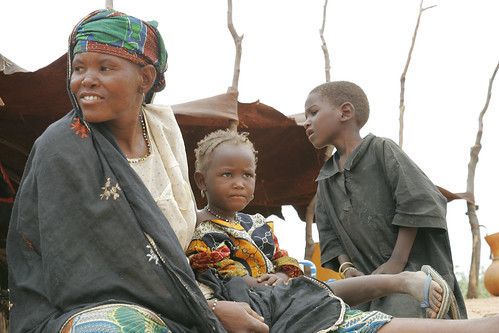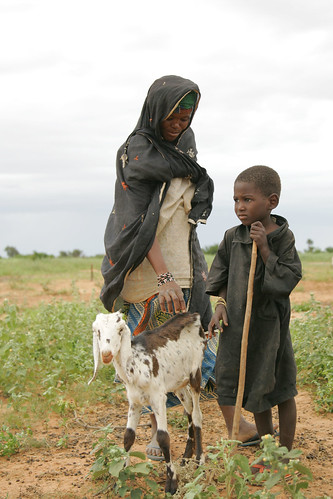Adopting from Niger
Notice: As of July 14, 2014, all individuals and agencies facilitating international adoptions must be in compliance with the Intercountry Universal Accreditation Act.
The information contained on this website is for educational purposes only and is not intended to be a substitute for professional legal advice. Always seek the advice of a licensed and qualified professional. While the content of this website is frequently updated, information changes rapidly and therefore, some information may be out of date, and/or contain inaccuracies, omissions or typographical errors.
Contents
About Niger
Niger became independent from France in 1960 and experienced single-party and military rule until 1991, when Gen. Ali SAIBOU was forced by public pressure to allow multiparty elections, which resulted in a democratic government in 1993. Political infighting brought the government to a standstill and in 1996 led to a coup by Col. Ibrahim BARE. In 1999, BARE was killed in a counter coup by military officers who restored democratic rule and held elections that brought Mamadou TANDJA to power in December of that year. To learn more please read About Niger.
Hague Convention Information
Niger is not party to the Hague Convention on Protection of Children and Co-operation in Respect of Intercountry Adoption (the Hague Adoption Convention). Intercountry adoptions of children from non-Hague countries are processed in accordance with 8 Code of Federal Regulations, Section 204.3 as it relates to orphans as defined under the Immigration and Nationality Act, Section 101(b)(1)(F).
PLEASE NOTE: Nigerien law does not technically permit adoptions by couples with biological children. The Direction de la Protection de l'Enfant (DPE) may review a longstanding policy of granting exceptions in the future.
Who Can Adopt
To bring an adopted child to the United States from Niger, you must meet eligibility and suitability requirements. The U.S. Department of Homeland Security, U.S. Citizenship and Immigration Services (USCIS) determines Who Can Adopt under U.S. immigration law. To learn more please read about Who Can Adopt from Niger.
Who Can Be Adopted
In addition to U.S. immigration requirements, Niger has specific requirements that a child must meet in order to be eligible for adoption. To learn more please read about Who Can Be Adopted from Niger.
How to Adopt
Adoption Authority
Ministère de la Population, de la Promotion de la Femme et de la Protection de l'Enfant, Direction de la Protection de l'Enfant (Ministry of Population, Promotion of Women, and Protection of Children, Department of Child Protection) and Ministère de la Justice et Garde Des Sceaux (Ministry of Justice and Keeper of the Seals)
The Process
The process for adopting a child from Niger generally includes the following steps:
- Choose an Adoption Service Provider
- Apply to be Found Eligible to Adopt
- Be Matched with a Child
- Adopt or gain legal custody of the child in Niger
- Apply for the Child to be Found Eligible for Adoption
- Bring Your Child Home
To learn more please read about How to Adopt from Niger.
Traveling Abroad
Applying for Your U.S. Passport
A valid U.S. passport is required to enter and leave Niger. Only the U.S. Department of State has the authority to grant, issue, or verify U.S. passports. Getting or renewing a passport is easy. To learn more please read about Traveling Abroad in Niger.
After Adoption
What resources are available to assist families after the adoption?
Many adoptive parents find it important to find support after the adoption. Take advantage of all the resources available to your family -- whether it's another adoptive family, a support group, an advocacy organization, or your religious or community services.
Here are some good places to start your support group search:
Child Welfare Information Gateway
North American Council on Adoptable Children
Adoption Services Support Group for Adopting Persons
Contact Information
U.S. Embassy in Niger
Rue des Ambassades, BP 11201 Niamey, Niger, Tel. (227) 72-26-61 Fax. (227) 73-31-67 Email: consulateniamey@state.gov Internet: U.S. Embassy Niger
Centre d'Accueil des enfants en difficulté familiale Direction de la protection de l'enfant, Ministère du Développement Social, de la Population, de la Promotion de la Femme et de la Protection de l'Enfant BP 11386 Niamey, Niger Tel: 011-(227)-73-30-68
Embassy of Niger
2204 R. Street, NW Washington, DC 20008 Tel. (202) 483-4224 Fax. (202) 483-3169
Niger also has a mission to the United Nations in New York, but it does not handle consular issues, including those related to adoptions.
Office of Children's Issues
U.S. Department of State CA/OCS/CI SA-17, 9th Floor Washington, DC 20522-1709 Tel: 1-888-407-4747 E-mail: AskCI@state.gov Internet: U.S. Department of State
U.S. Citizenship and Immigration Services (USCIS)
For questions about immigration procedures: National Customer Service Center (NCSC) Tel: 1-800-375-5283 (TTY 1-800-767-1833) Internet: USCIS
For questions about filing a Form I-600A or I-600 petition:
National Benefits Center
Tel: 1-877-424-8374 (toll free); 1-816-251-2770 (local)
Email: NBC.Adoptions@DHS.gov
SOURCE
Intercountry Adoption, Bureau of Consular Affairs. U.S. Department of State Country Information adoption.state.gov/country_information/country_specific_info.php?country-select=niger









